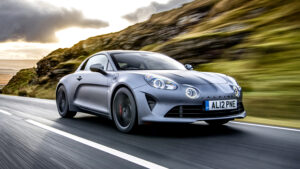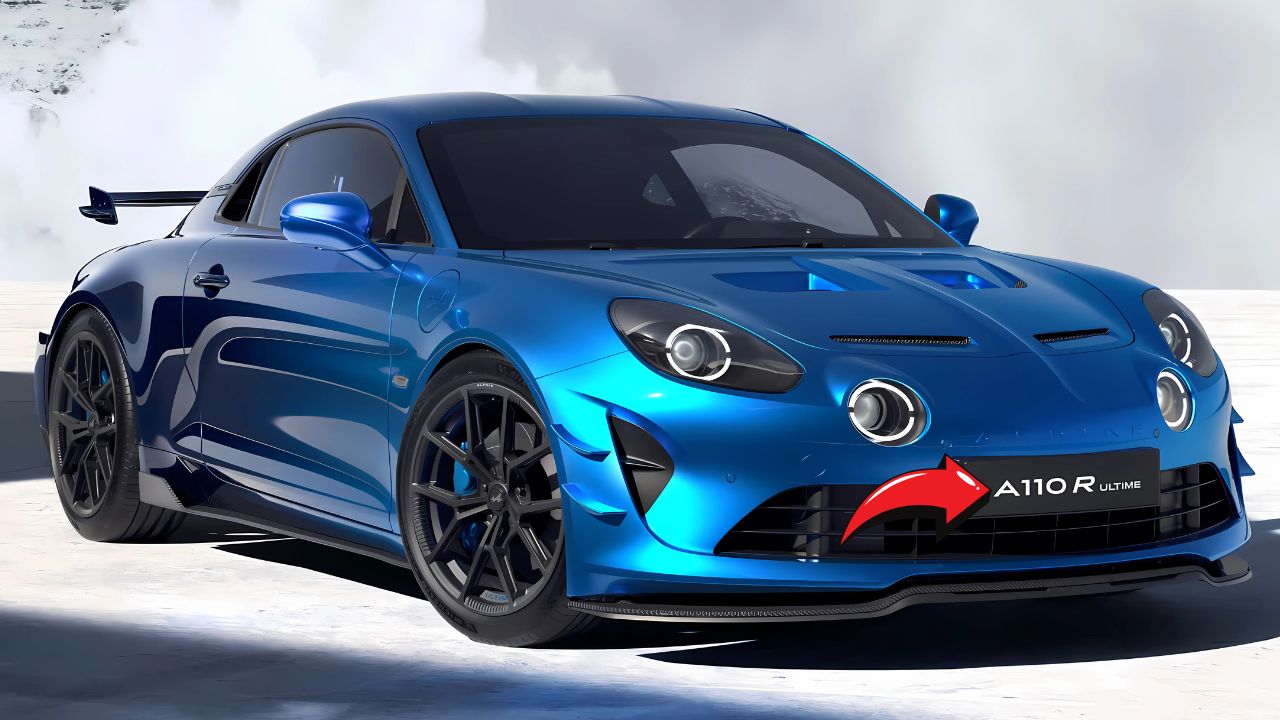The Australian automotive landscape is about to witness something truly extraordinary. After years of anticipation, the Alpine A110 EV is set to electrify Down Under with a performance package that defies every stereotype about electric vehicles being heavy and soulless.
This isn’t just another EV trying to masquerade as a sports car. The Alpine A110 EV represents a seismic shift in how we think about electric performance, promising to deliver thrills that would make even the most ardent petrolhead reconsider their prejudices.
The French Revolution Arrives
Alpine’s return to Australia couldn’t come at a more perfect time. The original A110 coupe may have struggled to find its audience locally, with only 106 units sold before regulatory changes forced its premature departure in 2022. But this new electric iteration promises to rewrite that story completely.
The brand’s CEO Philippe Krief has been remarkably candid about their ambitious goals. Speaking at the recent A390 launch, he revealed that the 2026 A110 EV will pack more than 500 horsepower (373kW) while maintaining a kerb weight under 1,450 kilograms. These aren’t just impressive numbers on paper – they represent a fundamental challenge to the established order.
To put this in perspective, the current Porsche 718 Cayman weighs approximately 1,450kg. Alpine is promising to match or beat this figure while delivering almost double the power of the most potent current A110 R.
Engineering Marvel: How They’re Doing It
The secret lies in Alpine’s innovative approach to electric vehicle architecture. Unlike many manufacturers who simply bolt batteries into existing platforms, Alpine has developed a bespoke electric sports car platform specifically for the A110 EV.
The powertrain features dual in-hub electric motors at the rear axle, related to those found in the upcoming Renault 5 Turbo 3E. This configuration allows for sophisticated torque vectoring while keeping the car’s centre of gravity low and its handling dynamics sharp.
Weight reduction has been an obsession for Alpine’s engineers. They’re utilizing advanced materials including aluminium and carbon fibre throughout the structure. The company has also pioneered high-energy-density battery technology that promises to deliver up to 600 kilometres of range without compromising the car’s athletic proportions.

Perhaps most intriguingly, Alpine is exploring the possibility of replaceable battery packs. This could revolutionize the ownership experience, allowing drivers to upgrade to newer battery chemistry while maintaining optimal performance throughout the car’s lifecycle.
Australia’s EV Sports Car Opportunity
The timing for the A110 EV’s Australian debut couldn’t be better. The local electric vehicle market exploded in 2024, with over 91,000 EVs sold – a record that’s expected to be smashed in 2025.
However, the vast majority of these sales have been concentrated in SUVs and family sedans. The sports car segment remains virtually untouched by electrification in Australia, creating a unique opportunity for Alpine to capture the imagination of driving enthusiasts.
Current options for performance-oriented EVs in Australia are limited. Tesla’s Model S Plaid offers incredible straight-line performance but lacks the finesse that sports car purists crave. BMW’s i4 M50 provides a more balanced approach but still feels more like a fast sedan than a proper sports car.
The A110 EV promises to fill this gap with authentically sporty credentials. Its rear-wheel-drive configuration, low centre of gravity, and lightweight construction should deliver the kind of handling dynamics that made the original A110 such a darling among automotive journalists worldwide.
Performance That Redefines Expectations
The numbers surrounding the A110 EV are genuinely staggering. With over 373kW of power on tap, it will produce nearly twice the output of the current A110 R’s 224kW. Yet unlike traditional high-performance cars that compromise daily usability for peak power, the electric A110 promises to be more civilized in normal driving.
Electric motors deliver their maximum torque instantaneously, meaning the A110 EV should provide devastating acceleration from any speed. Industry insiders suggest a 0-100km/h time well under 3.5 seconds, putting it firmly in supercar territory.
The dual-motor rear setup enables individual wheel control, essentially providing an infinitely variable electronic differential. This technology should allow the car to corner with precision that would be impossible with a conventional mechanical setup.
Range anxiety, often cited as a concern with performance EVs, shouldn’t be an issue. The promised 600-kilometre range from the high-density battery pack exceeds what most drivers cover in a typical week, making the A110 EV genuinely practical for daily use.
Design Evolution: Familiar Yet Revolutionary
Alpine has been careful to ensure the A110 EV maintains visual continuity with its combustion-engine predecessor. The fundamental silhouette – that distinctive helmet-visor rear screen, sculpted flanks, and cab-forward proportions – will remain largely unchanged.
However, keen observers will notice evolutionary details that hint at the car’s electric nature. The circular daytime running lights have been replaced with a more contemporary hexagonal motif, while aerodynamic enhancements like a subtle ducktail spoiler optimize efficiency.
The design philosophy follows Porsche’s approach with the 911 – evolution rather than revolution. As Alpine’s leadership puts it, “Porsche doesn’t make a square 911,” acknowledging that iconic sports cars should maintain their essential character even as they embrace new technology.
Inside, expect a more tech-focused cockpit that reflects the car’s advanced electric architecture while maintaining the driver-centric ergonomics that made the original A110 so appealing.
Competition and Market Positioning
The A110 EV will enter a market largely defined by Porsche’s upcoming electric Cayman. This creates a fascinating dynamic, as both cars represent historic European sports car manufacturers’ first serious attempts at electric performance vehicles.
Porsche’s reputation and established dealer network in Australia give it certain advantages. However, Alpine’s commitment to keeping weight down and prioritizing driving dynamics over luxury could appeal to purists who feel modern Porsches have become too refined and disconnected.
Pricing remains unconfirmed, but the previous A110 Pure started at $87,340 plus on-roads when last sold in Australia. The electric version’s advanced technology and increased performance will likely command a premium, potentially positioning it around the $120,000-150,000 mark.
This would place it squarely against the Porsche Cayman EV while undercutting more expensive alternatives like BMW’s i8 successor or any potential electric Audi TT replacement.
Australian Infrastructure Readiness
One concern for potential A110 EV buyers might be Australia’s charging infrastructure. However, the situation has improved dramatically since the original A110’s departure.
The car will support 190kW DC fast charging, allowing 10-80% charging in approximately 25 minutes. More importantly, its 600km range means most owners will rarely need public charging for daily use.
Australia’s major cities now have comprehensive fast-charging networks, while rural coverage continues to expand rapidly. By the time the A110 EV arrives in late 2026 or early 2027, range anxiety should be largely a thing of the past for most Australian drivers.
The car will also feature vehicle-to-load (V2L) capability, allowing it to power external devices – perfect for camping trips or track day tyre warmers.
Track Day Credentials
Alpine hasn’t forgotten the A110’s track day heritage. The electric version will feature multiple driving modes, including a dedicated Track setting that optimizes all systems for maximum performance.
The instant torque delivery of electric motors should make the car devastatingly quick on track, while the advanced torque vectoring system will help drivers explore the limits with confidence.
Heat management, often a concern with performance EVs, has been carefully considered. The thermal management system is designed to maintain consistent performance even during extended track sessions.
A unique ‘overtake’ function, accessed via a steering wheel button, unleashes maximum power for 10 seconds before requiring a brief recovery period – adding a strategic element to track driving that petrol cars simply can’t match.
The Road Ahead
Alpine’s electric future extends well beyond the A110 EV. The brand is developing a complete “Dream Garage” of electric vehicles, including the recently revealed A390 SUV and a future four-seat A310 grand tourer.
This comprehensive approach suggests Alpine is serious about establishing itself as a permanent fixture in the Australian market, rather than making another brief appearance.
The success of the A110 EV could pave the way for these additional models, potentially transforming Alpine from a curious footnote in Australian automotive history into a legitimate alternative to established premium brands.
For Australian driving enthusiasts, the A110 EV represents something genuinely special – the chance to experience cutting-edge electric performance wrapped in a package that prioritizes driver engagement over straight-line speed.
Frequently Asked Questions
When will the Alpine A110 EV be available in Australia? The Alpine A110 EV is expected to arrive in Australian dealerships in late 2026 or early 2027, following its European launch.
How much will the Alpine A110 EV cost in Australia? While official pricing hasn’t been announced, expect the A110 EV to cost significantly more than the previous petrol model’s $87,340 starting price, likely positioning it in the $120,000-150,000 range.
Will the Alpine A110 EV be available with all-wheel drive? Initially, the A110 EV will only be available with rear-wheel drive and dual motors. Alpine has confirmed a triple-motor all-wheel-drive version will follow later, marking the first time the A110 has offered AWD.
The Alpine A110 EV promises to be more than just another electric vehicle – it represents a fundamental reimagining of what an electric sports car can be. For Australia’s driving enthusiasts, the wait will definitely be worth it.

